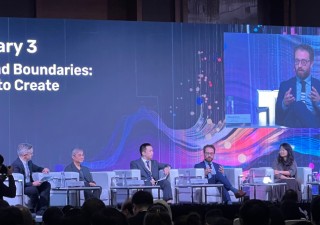IP Week @ SG: In the AI era, it’s okay to keep still and not react
30 August 2024

Maxwell Sills, general counsel for San Francisco-based independent research lab Midjourney, says he advocates for keeping still and not reacting immediately in the era of rapidly evolving technologies, namely AI and Generative AI, which have taken the world by storm in the past five years.
During this period, the U.S. Patent and Trademark Office saw more than half a million patent applications for AI-related innovations. And that is just in the United States.
AI is also expected to pump up the global economy by infusing its coffers with up to US$15.7 trillion by 2030.
“There is a feeling of ‘something new is happening, we must react.’ And I try to advocate the ability to stay still. You don’t need to react to everything immediately,” said Sills, speaking in Singapore at IP Week @ SG. Sills also owns legal firm Open Advisory Services, which supports AI startups with embedded legal teams. He also led Google’s open source legal team.
Sills, whose business advises companies on how to follow the law, explained that it’s becoming really confusing for small- and medium-sized enterprises to know what the law is and what the law will be in two or three years.
“Because companies are so unsure of what the law will be, they are forming their own standard bodies. So in the past year, there must have been over 20 new non-profit international standard bodies devoted to AI,” he said.
Among these international standard bodies for the responsible development and deployment of AI systems are the Frontier Model Forum and the Security Collaboration Forum. According to Sills, these bodies use abstract words to show companies want to make an effort. “So what’s going on here? As a society, we’re not articulating clearly the things we’re afraid of about AI and advancing regulations while also promoting innovation. Companies are trying to frontrun regulators and trying to put forward standards, for example, the watermarking standards,” he said, adding that such standards include those for doctored photos.
He emphasized that IP law isn’t just a set of rules open to arbitrary change. It includes a set of principles that people could follow and that will help them think. “In the U.S., it’s fundamentally [about] IP giving creative people a limited monopoly over the good things they do as long as those things advance society, and as long as the monopoly does not hurt more people. If small- and medium-sized companies know what the principles and values are, they’re going to follow that and this ultimately leads to more innovation,” said Sills.
While there has been an explosion of activity in the AI space worldwide and excitement for the groundbreaking technology is prevalent, the fear of AI taking away jobs from humans has also found its way in daily conversation. For Sills, the fear is real even as there isn’t always a substantial basis for this. But then again, anything new, including new technology such as Gen AI, can be scary. Yet, Sills shared they have a lot of experience with the international IP community passing regulations not based on fear, but based on really good, solid principles.
“[But], If you can’t act out a principle,” Sills reminded, “it’s okay to be still. You don’t need to react if you don’t know what to do and are still trying to think.”
Sills was one of the speakers at the IP Week @ SG 2024 plenary session titled “The Crossroads of IP: Man or Machine in the Age of AI” on August 28, 2024, at the Marina Bay Sands Expo & Convention Centre in Singapore. IP Week @ SG is an annual convention that brings together the innovation community comprising policymakers, business leaders and legal experts, to discuss the latest in IP.
– Espie Angelica A. de Leon, reporting from Singapore






